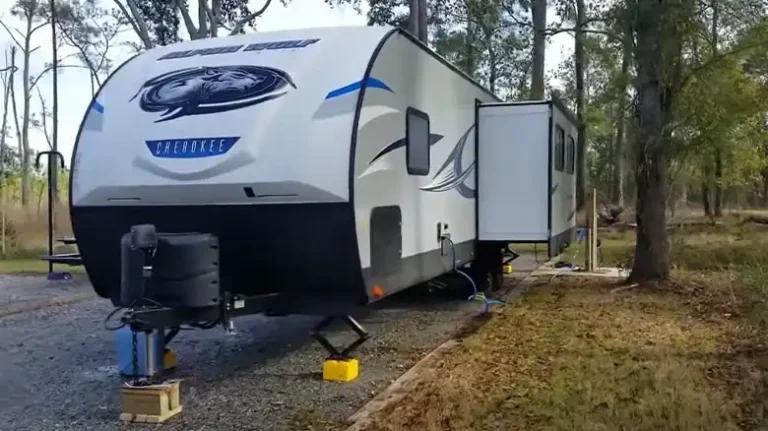RV Fuse Box Making Noise | Signs, Causes, and Fixation
RV electrical systems are complex networks that provide power to all of the appliances, lights, and accessories in your motorhome. The fuse box is at the heart of this system, acting as a central hub that routes power to different circuits. If your RV fuse box starts making unusual noises, it’s often a sign of an underlying issue that needs to be addressed. However, it’s worth noting that a mild buzz is normal for magnetic-type fuse.
Some potential causes include loose connections, corrosion, overloaded circuits, or component failures.

Locating the Noise
The first step in diagnosing a noisy fuse box is to carefully listen to pinpoint the exact location of the noise. The sound may be coming from inside the fuse box itself or somewhere along the wiring leading to or from the box. Visually inspect the fuse box as well, looking for any loose hardware, signs of overheating or arcing, or other visible issues. Pay attention to where the wires connect to the bus bars and fuses, as these junction points are common sources of electrical noise when loose.
What Causes RV Fuse Box Noise?
There are a few common explanations for fuse box noise in RVs:
Failing Components
Persistent electrical arcing noises are a warning sign that fuses or other components are beginning to fail. Inspect closely for any discolored or cracked fuses and check voltages across wires with a multimeter. Replace any visibly damaged parts right away.
Buzzing is also a common noise from magnetic circuit breakers. They contain a coiled wire that pulls on a ferrite strip to trip the breaker when the magnetic field overload gets too strong. Some buzzing can happen normally with magnetic breakers when operating within a non-overload current range. Pure sine wave AC power will prevent the buzzing sound.
The Converter Fan

Another likely reason is that the fuse box is not the culprit at all, it’s the converter box. The fan inside the converter box often makes a light buzzing or humming noise when it has to operate at high speed, which is almost all the time. This, coupled with the fact that it’s often dirty, causes the buzzing noise. It’s likely nothing to worry about because the converter is simply charging the 12V battery and the fan is keeping it cool.
Loose Parts
Vibration while driving can cause screws, nuts, bolts, and wire terminals inside the fuse box to become loose over time. Check that all connections are tight and secure. Components like fuse clips or bus bars may also be rattling around, in which case you may need to bend tabs to secure them tightly.
Corrosion
Moisture and road debris can lead to corrosion in fuse box connections. Look for any green or white oxidization and clean contacts thoroughly with an electrical contact cleaner spray. Reconnect wires and fuses, applying a thin coat of dielectric grease to prevent future corrosion.
How to Fix RV Fuse Box Noise Issue
If as we have mentioned earlier, there aren’t any loose screws, it’s the magnetic fuse noise. Then you don’t necessarily need to do anything about it. It is quite normal. However, if you suspect the fuse box is damaged or is malfunctioning, replacing damaged fuses, resecuring loose hardware, cleaning corrosion, and rewiring any concerning connections should resolve most simple fuse box noises.
If the noise stems from electrical interference in DC wires, installing suppressors can filter out line noise. For persistent fuse box issues, have an RV electrician thoroughly inspect the box and all connected systems. They can locate any underlying electrical faults.
Check the fan for dust buildup and clean as needed. If the fan is damaged, it may need to be replaced. Locate the capacitors and listen for any buzzing or squealing. If suspected faulty, consult a qualified RV technician for replacement.
Finally, Identify the overloaded circuit and reduce the power draw by turning off unnecessary appliances. Consider upgrading the circuit or adding additional circuits if needed.
What are the signs of a bad fuse box?
A vehicle fuse box that is malfunctioning or going bad often exhibits several warning signs that indicate underlying issues. These may include fuses that keep blowing suddenly, unusual burning smells coming from the area of the fuse box, visibly cracked or discolored fuses, audible buzzing or popping noises emanating from the box, power fluctuations where lights dim or electronics turn off randomly, flickering lights when certain systems switch on, excessive heat radiating from the fuse box, and rust or corrosion building up on electrical terminals or fuses.
Experiencing multiple symptoms like blown fuses combined with buzzing sounds, flickering interior lights paired with noticeable corrosion, or a hot fuse box plus funky smells would point to a potentially failing fuse box situation that warrants having an auto electrician come to inspect and remedy whatever problems may be developing before total electrical failure happens.
How many years does a fuse box last?
The good news is fuse boxes are rated for very long use, exceeding 15-20 years or more. So, if there’s nothing wrong with your RV fuse box, except a light humming noise, you don’t need to do anything about it or replace it either.
Summing Up
As long as it is nothing but some light buzzing, either from the fuse or the converter box, you don’t need to worry about anything blowing up. In fact, a tightly sealed fuse box doesn’t let fire escape from it easily. However, this doesn’t mean you don’t need to check things up. Make sure to properly inspect and replace damaged parts if you hear anything above a light humming noise coming from the fuse box of your RV.
Good luck and thanks for reading.







